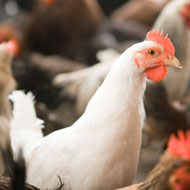Industry responds to claims a ‘mountain of drugs’ are used on poultry farms

‘Ionophores have some antibacterial action but they are not classified by the EU or UK authorities as antibiotics.'
Vets and farming organisations have said they are disappointed by a BBC Countryfile programme, which claimed there is “a hidden mountain of antimicrobial drugs still being used on many of the UK’s chicken farms”.
The British Poultry Council (BPC) said the statement is “speculative and shows a lack of clarity around the classification and use of ionophores”.
Journalist Tom Heap said campaigners are claiming that ionophores, which are added to chicken feed to prevent coccidiosis, could pose a threat to human health and the environment.
“Some countries, including the USA, are in no doubt that these drugs are antibiotics,” he added. “But the EU, and so the UK, has classed them simply as feed additives. That means they aren’t included in the industry’s seemingly impressive figures on antibiotic use. So, while the use of antibiotics on that AMR hitlist has gone down to 14 tonnes, the use of ionophores has gone up by to a staggering 280 tonnes a year.”
During the programme, Cóilín Nunan of the Alliance to Save Our Antibiotics claimed ionophores can leave residues in food and are “potentially toxic antibiotics” that could harm the consumer and increase resistance to antibiotics used in humans. In addition, he said most ionophores are excreted in chicken droppings and could be spread in the environment in the form of manure.
Response from the industry
The claims have prompted a number of vets and organisations to issue clarifications.
Christine Middlemiss, the UK’s chief vet, said on Twitter: ‘Using and talking about evidence correctly is important. Ionophores are not antibiotics.’
The Responsible Use of Medicines in Agriculture Alliance (RUMA) said the ‘misrepresentation’ of ionophore coccidiostats in the programme was ‘disappointing’.
According to a statement from the group: ‘Ionophores have some antibacterial action but they are not classified by the EU or UK authorities as antibiotics, and there is no evidence they create any cross-resistance issues with gram negative bacteria such as E coli or zoonotic pathogens such as campylobacter or salmonella.’
Commenting after the programme, the British Poultry Council said it is important to “steer clear of speculations when talking about such an important subject”. The World Health Organisation, World Animal Health Organisation (OIE), and the European Surveillance Programme of Veterinary Antibiotics have confirmed that ionophores do not have an impact on human health.
The council also pointed out that there are strict regulations surrounding withdrawal periods which prevent antibiotic residues in meat. Furthermore, if coccidiosis is not controlled, it could lead to poor health and welfare in birds, necessitating the use of medically important antibiotics.
Responding to the comments, a BBC spokesperson said: The BBC’s Countryfile programme accurately reflected that ionophore coccidiostats are regularly used by the broiler industry in feed to prevent coccidiosis in poultry.
‘In the film, the British Poultry Council acknowledged that ionophores are antibiotics but stated that they are not classed as such by the EU or UK authorities. The programme accurately reflected campaigners’ concerns that ionophores may increase resistance to other antibiotics and that residues could be left in food and passed into the environment through the spreading of chicken manure as fertilizer.’



 BSAVA is to partner with BVA Live (11-12 June 2026) to champion clinical research.
BSAVA is to partner with BVA Live (11-12 June 2026) to champion clinical research.